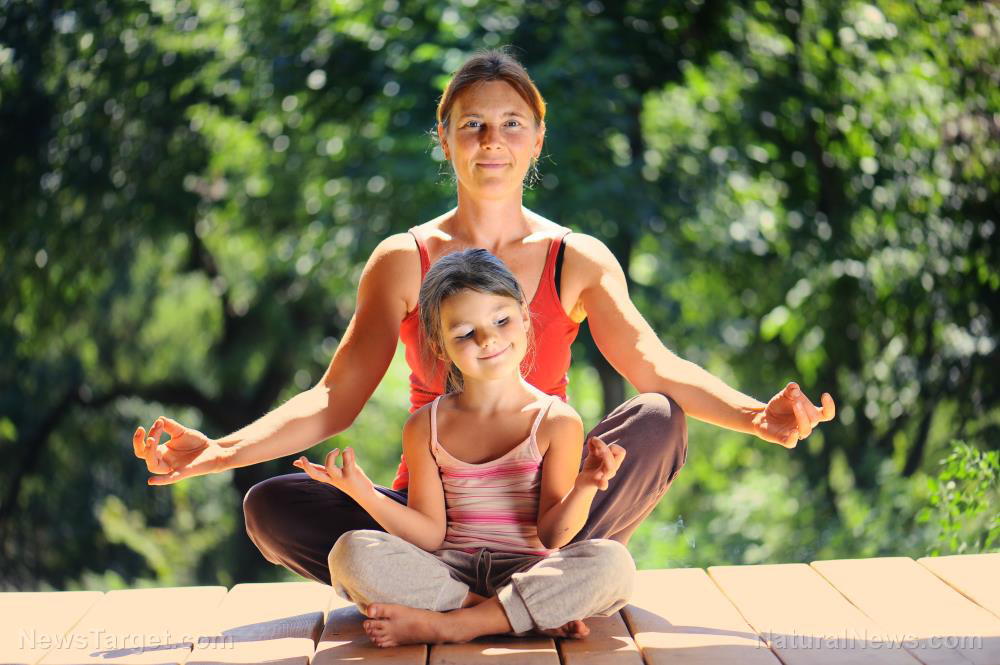Study suggests that individuals with anxiety and depression can manage their symptoms using breathing exercises and yoga
09/17/2019 / By Edsel Cook

Anxious and depressed? Massachusetts-based researchers suggest taking up breathing exercises or yoga sessions to ease your symptoms. The two practices appear to improve mood by stimulating the vagus nerves and increasing the levels of gamma-aminobutyric acid (GABA), an essential neurotransmitter in the brain.
Vagus nerves serve as connections between the base of the brain and many essential organ systems. They are part of the parasympathetic nervous system, which restores the body to normal levels after stressful periods caused by adrenaline and fear responses.
The parasympathetic nervous system calms the brain by releasing large amounts of GABA. The inhibitory neurotransmitter reduces the activity levels of brain cells, bringing them down from the high caused by the parasympathetic’s opposite and counterpart, the sympathetic nervous system.
Together, these two nervous systems form the autonomic nervous system. This unified system runs on automatic and oversees the various bodily processes that contribute to the overall health of a person.
Many researchers applied the vagal nerve-GABA theory to their studies of potential treatments for mental health issues like anxiety and depression. They believed that mood disorders came from unhealthy levels of activity in the sympathetic nervous system, which went back to normal after the activation of the parasympathetic nervous system. (Related: These 3 herbs treat depression naturally.)
Can breathing exercises and yoga improve the symptoms of anxiety disorders?
Boston University researchers looked at the effects of yoga and similar practices on GABA levels. They assembled a control group of healthy volunteers and another group of patients with anxiety and major depressive disorder, post-traumatic stress disorder (PTSD), panic disorder, and alcohol-related disorders.

|
Discover how to prevent and reverse heart disease (and other cardio related events) with this free ebook: Written by popular Natural News writer Vicki Batt, this book includes everything you need to know about preventing heart disease, reversing hypertension, and nurturing your cardiac health without medication. Learn More. |
The participants joined an Iyengar yoga course for 12 weeks. They practiced both yoga and coherent breathing, the latter being a breathing exercise that increased parasympathetic activity by decreasing the number of breathing cycles in each minute.
Earlier studies showed that yoga and coherent breathing improved the symptoms of clinical conditions like anxiety disorders, depression, and PSTD. The two practices restored the healthy balance between the parasympathetic and sympathetic nervous systems.
The Boston University researchers evaluated GABA levels in the thalamus, the brain region that acts as the communications hub between other parts of the brain. They did the same for other vital neurotransmitters like choline.
They performed the scans at the start of the trial, before the session during the 12th week of the yoga course, and after the end of the same session. They also gave the participants several tests that measured the effectiveness of the course on the symptoms of anxiety and depression.
The combo of coherent breathing and yoga increases GABA levels
The results of the Boston University experiment indicated that the GABA levels in the thalamus of anxious and depressed participants returned to normal after 12 weeks of yoga workouts and breathing exercises. During the final session of the trial, the participants displayed regular GABA activity before and after the training.
Other tests showed improvements in the statistic and clinical scores of the participants diagnosed with anxiety disorders. The patients reported higher levels of physical energy, positive engagement, vitality, and tranquility after going through the course.
Finally, coherent breathing and yoga exercises brought only slight improvements to the levels of the other neurotransmitters. It appeared that these healthy practices mainly affected the vagal nerves and GABA levels.
The main barriers to using a yoga course for mood therapy are its time requirements and the difficulty of achieving certain positions. However, the vital poses involving breathing and deep relaxation are straightforward. In particular, Iyengar yoga is safer and more accessible than traditional yoga, which can make it more attractive to anxious and depressed people who want to improve their mental well-being.
Sources include:
Tagged Under: alternative medicine, anxiety relief, beat depression, brain function, breathing exercises, depression symptoms, GABA, mental health, mind body science, natural cures, natural medicine, remedies, research, Yoga
RECENT NEWS & ARTICLES
Natural.News is a fact-based public education website published by Natural News Features, LLC.
All content copyright © 2018 by Natural News Features, LLC.
Contact Us with Tips or Corrections
All trademarks, registered trademarks and servicemarks mentioned on this site are the property of their respective owners.



















